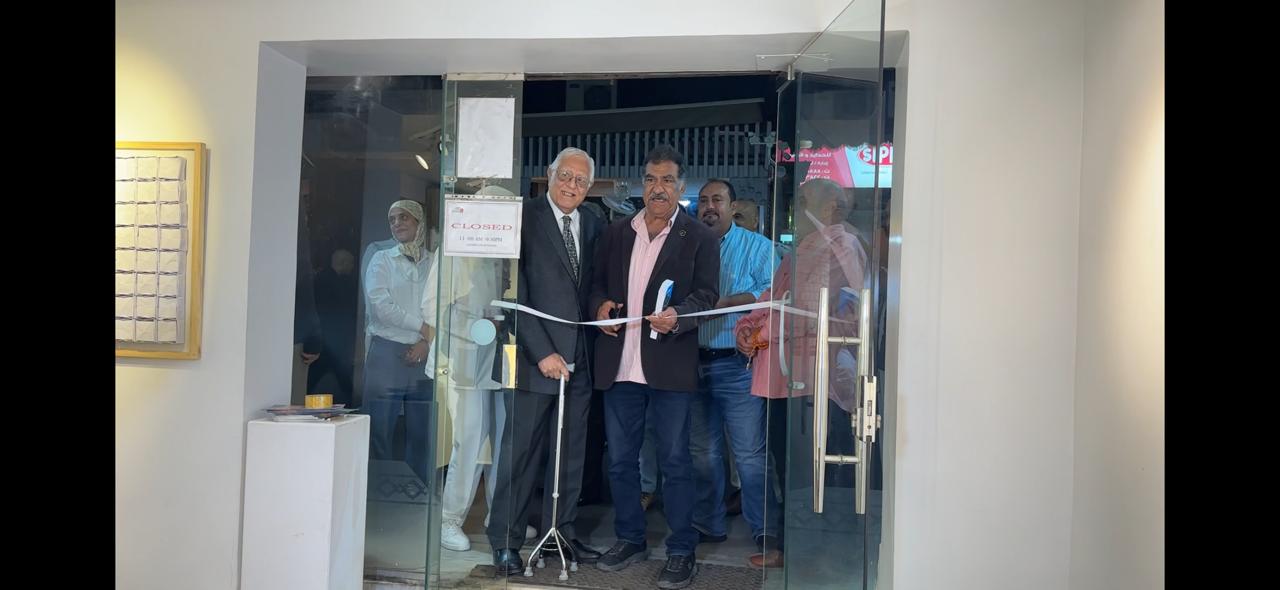The Art Corner gallery in Zamalek hosted last Thursday an exhibition titled “A Call for Optimism” by artist and diplomat Yousri Al-Qawidy. The event, inaugurated by renowned artist Mohamed Abla, attracted a large audience of art enthusiasts and fellow artists. The exhibition features 31 white origami artworks, showcasing Al-Qawidy’s unique creative vision.
In his remarks, Al-Qawidy reflected on his long journey in the world of art, which he describes as a lifelong passion that began in his childhood during the 1940s. “I discovered that my visual memory surpassed my auditory memory, and from that moment, expressing myself through drawing became an intrinsic part of my being,” he shared.

As a young man on the cusp of university, Al-Qawidy initially aspired to study architecture, viewing it as a profession closely tied to his love for drawing and painting. However, fate led him down a different path, steering him toward economic and commercial studies. “I accepted my destiny and completed my university education while continuing to engage in photography, my favourite hobby because life without art holds no meaning,” he stated.
Reflecting on the artistic landscape of the 1950s in Egypt, Al-Qawidy noted that many artists adhered to a realistic, figurative style—some leaning towards classical realism while others adopted an impressionistic approach. Influenced by these artists, he initially followed a similar path. However, through exploration and reading, he discovered innovative artistic directions, realizing that art encompasses dimensions beyond mere representation and realism.

During the 1960s, Al-Qawidy balanced a job at the Ministry of Economy during the day with his studies at the Faculty of Fine Arts in the evening, a period he described as immensely fulfilling. Yet, once again, destiny intervened when his mother urged him to take the Foreign Ministry exam to join the diplomatic service. “I complied, albeit reluctantly, to avoid disappointing her,” he explained. He succeeded and joined the diplomatic corps in 1962, eventually promoted to ambassador and assistant to the Minister of Foreign Affairs before retiring in 2000.
His diplomatic career provided him with opportunities to travel and live abroad, exposing him to diverse cultures and artistic movements. “I found myself in love with two passions: art and diplomacy,” he remarked. After retiring from government service, he embraced his artistic identity, allowing the artist within to flourish after years of being confined by formal duties.

During his time abroad, Al-Qawidy observed the evolution of visual arts, noting a shift from realism towards abstraction and conceptual art. He witnessed how artists began to analyze and deconstruct their subjects, leading to new forms of expression, such as abstract expressionism and geometric abstraction. “Art movements diversified, yet they remained rooted in traditional forms—paintings and sculptures,” he explained.

He highlighted a transformative moment in the art world when artworks began to move beyond gallery walls, expressing ideas and concepts more freely. Conceptual art gained prominence, bolstered by digital and electronic innovations, leading to a broadening of visual artistic expressions.
Having spent over a quarter-century abroad, Al-Qawidy gained invaluable experiences that deepened his understanding of the factors and philosophies driving contemporary visual arts.
As he reflects on his artistic journey, Al-Qawidy asserts that the contemporary artist has become akin to a writer or philosopher, expressing profound thoughts and feelings through visual mediums, whether traditional or unconventional. “The role of the contemporary artist has evolved beyond mere inheritance of styles and ideas; they are now thinkers, addressing not only subjects and issues but also proposing ways to navigate or overcome them,” he concluded.
